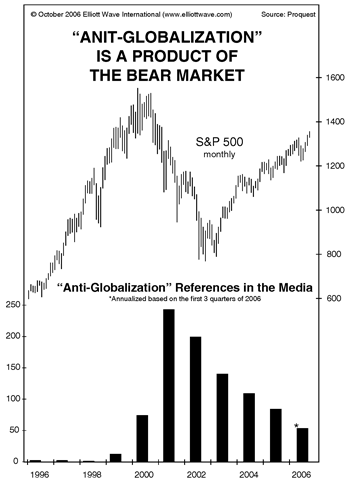
According to the IMF, globalization is a growing economic interdependence of countries worldwide through increasing volume and variety of cross-border transactions, free international capital flows, and more rapid and widespread diffusion of technology. In other words, globalization is what happens in a bull market. As the Sociotimes entry of December 13, 2005 explained, globalization is a “catch-all phrase” for the inclusionary forces that break down barriers to social exchange as a bull market in social mood progresses. The longer and higher a bull market goes, the more progress globalization is likely to make.
In their pontifications over globalization and its ramifications, commentators simply describe the current status of the trend in social mood. In this recent speech, for instance, Joseph Stiglitz lists a series of problems with globalization, but ultimately concludes “that it can be made to work and offer a promising future for the world.” The socionomic translation of Stiglitz’s position and his new book, Making Globalization Work, is that social mood is not as one-sidedly bullish as it was in the first quarter of 2000 when all the major U.S. averages hit new all-time highs, but it’s definitely recovering from the thrashing it took in the bear market of 2000-2002. As the “Globalization:Turning With the Tide” chart of key globalization books shows, globalization’s positive reputation expands with a rising trend. After being characterized as an unstoppable and positive unifying force in The Lexus and The Olive Tree near the peak in 1999, a series of tomes suddenly attacked the phenomenon as a “system gone bad” starting in late 2000. As this updated version of the chart shows, a slightly more reserved, but decidedly bullish series of books on globalization has accompanied the rally highs of 2004-2006.
On February 13, we also covered the emergence of anti-globalization, the bear market counterweight to the idea of globalization. The updated chart (shown above) of anti-globalization references shows how the “movement” waxed with the initial bear market of the 2000-2002 and waned with the rally since 2002. Wikipedia hits on the bull and bear market sides of the globalization story, with two opposing depictions:
Economically and socially positive: As an engine of commerce; one which brings an increased standard of living — prosperity to developing countries and further wealth to First World and Third World countries. This view claims that economic prosperity brings about social prosperity.
Economically, socially, and ecologically negative: As an engine of "corporate imperialism"; one which tramples over the human rights of developing societies, claims to bring prosperity, yet often simply amounts to plundering and profiteering. Negative effects include cultural assimilation via cultural imperialism, the export of artificial wants, and the destruction or inhibition of authentic local and global community, ecology and cultures.
A Wikipedia review of the genesis of “globalization” also reveals its bull market lineage. The term originated at the start of Cycle III in 1944 and was applied to the economy and markets at the beginning of Cycle V in “around 1981.” It’s popular usage is generally traced to a Harvard Business Review article by Theodore Levitt called "Globalization of Markets," which appeared in 1983, the first full year in which the Dow Jones Industrial Average traded over 1000. A burst of anti-globalization references appeared early this year, but the updated chart shows the calming influence of a rising social mood as registered by new highs in the Dow Jones Industrial Average. When the Dow turns down, the negative side of the globalization story will undoubtedly. |
